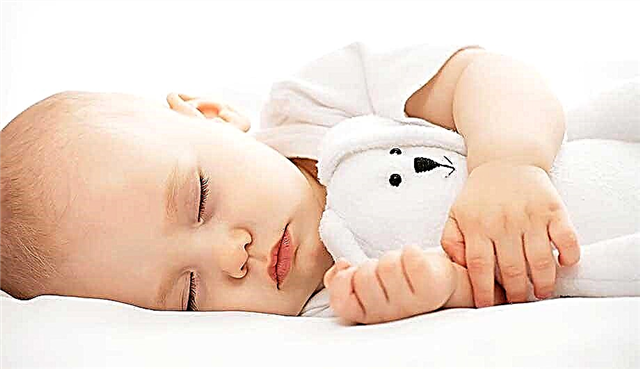Young parents know that newborns sleep a lot. They need adequate rest in order to grow and develop. With age, needs change, periods of activity increase. Many begin to worry if the child sleeps a lot when he is sick, not understanding why this is happening. After all, before that, the baby had much less rest. Most often, this does not hide dangerous symptoms. In order not to cause complications and to help the baby feel comfortable, you need to take care of the quality of his sleep, not forgetting about the drinking regimen and treatment.

The baby is sleeping
How much does a child sleep under one year old
A newborn baby sleeps almost all the time. He opens his eyes to eat, to announce that his diaper is full. Then he falls asleep again. So, children up to a month rest about 20 hours a day.
Gradually, the regime begins to change. The baby becomes more interested in what is happening around, carefully examines the surrounding objects, studies people. The period of wakefulness increases:
- By the time they are one month old, babies have been sleeping for about 18 hours. Usually 10 of them fall on a night's rest. Kids still do not distinguish between morning and evening and rush to close their eyes when they get tired. Therefore, parents must connect here in order to form the correct regime in the baby;
- At 3 months, babies rest from 14 to 17 hours. Sleep at night takes longer;
- By six months, the activity of infants increases. Some children are already sitting and crawling, they are involved in communication with adults, they are attracted and interested in everything. At night, babies sleep on average 11 hours, during the day - 3-4;
- At 9 months, the rest time is reduced again. This reduces the number of daytime dreams. At night, babies continue to rest 10-12 hours, in just a day - 13-16;
- By the time they are one year old, some babies go to one day nap. But it becomes longer, takes about 2-3 hours. Night rest remains the same.
The given data are averaged. They can be guided by in order to understand whether the infant's regime is optimally established. You need to trust your own child, observing his well-being.

Healthy and active baby
If the baby sleeps peacefully, without frequent awakenings, and lies down and gets up at about the same time, and is active and cheerful during the day, has a good appetite and gains weight, then everything is in order. In this case, you should not worry, even if his sleep does not coincide with age norms.
Why does a child sleep a lot when sick
Usually, if the child is sick and sleeps constantly, you should not be afraid of this. After all, all the forces of the body are aimed at fighting infection.
Sleepiness increases if the baby's body temperature rises. But this does not mean that the baby does not need to be woken up and fed. The lost energy and strength must be replenished in order to bring the moment of recovery closer.
If the baby is breastfed, this is much easier. It is enough to put the baby to the breast, and he will wake up feeling a familiar and dear smell.
Note! In addition, mother's milk is 80 percent water, which means that thanks to it, it is possible to establish a drinking regime.
With artificially fed babies, it is somewhat more difficult. But it is imperative to feed them. It is necessary to offer the child smaller portions, but more often, observing the proportions during preparation. If the baby is already eating complementary foods, then you should not give him new foods during the period of illness. You can offer vegetables and cereals, the main thing is not to do it forcibly. Better let the baby's strength be spent on fighting the disease than on digesting a portion of food. Appetite will return to him gradually as he recovers. The main thing is to continue offering food to the baby.

Poor appetite with illness
Important! If the child does not eat, he or she will not receive the necessary nutrients. This means that it will become even more weakened, which will only increase drowsiness.
There are alarming symptoms in which you need to call an ambulance:
- The child does not wake up for 5 hours in a row, and it is impossible to wake him up;
- Parents cannot feed the baby on their own;
- There are signs of dehydration, the baby has not written for a long time, his fontanel is fused, he cries without tears;
- The skin takes on a bluish tint;
- Breathing becomes hard and shallow;
- The temperature rises and does not go astray.
If there are no such signs, the child eats in small portions, drinks, then it is necessary to adhere to the prescribed treatment at home. The main thing is to provide the baby with comfort. It is the favorable environment at home, the optimal temperature and humidity that will help you recover faster.
During the period of illness, the child's regimen changes, the rest time increases, the activity decreases. Sleep is needed to restore strength, and the fact that it becomes long lasting is considered normal. As soon as the baby begins to return to his usual schedule, we can say that the fears are over, the child will soon be healthy.
Note! A baby can get sick at any age, in infants the disease develops rapidly, so parents should be aware of the symptoms that require immediate medical attention.
The child sleeps a lot after an illness
If at the end of the illness, especially after the temperature, the child sleeps for a long time, this is not surprising. He was exhausted after fighting the infection. In addition, when the temperature drops, great weakness is felt. The child is drawn to sleep, which is necessary to replenish the supply of energy. It will take time for the baby to return to the previous regime.

The kid is constantly sleeping
Perhaps the baby lacks nutrients and nutrients, especially if he refuses to eat when he is sick. As soon as the appetite returns to normal, the baby will begin to recover and become more active.
Not always, increased drowsiness is not dangerous. Sometimes it is observed in the following cases:
- In the presence of an infection that is asymptomatic;
- During an exacerbation of chronic diseases, for example, problems with the thyroid gland;
- The bacteria have attached, or the child begins to fall ill again, picking up a new virus on a weakened body.
To exclude the development of pathological processes, the treatment of an infant should be under the supervision of a doctor. Only he will be able to establish the true cause of the ailment, find out if it is pathological in nature or represents the next stage of recovery. It is good when the pediatrician can track changes in the baby's condition in dynamics.
Parents' actions
Parents should be close to the sick baby, constantly monitoring his well-being. The smaller the child, the faster the infection spreads, therefore, immediately after the onset of unpleasant symptoms, you must call a doctor.
It is imperative to monitor the temperature of the child, with an increase in which the babies are constantly sleeping. If it reaches critical levels, be sure to wake up the baby to give an antipyretic. If the baby is sweating, then you need to change his clothes, replace the bedding.
Parents should understand that drowsiness accompanies high body temperature and is also present with significant fluid loss. To prevent dehydration and further weakening of the child, moms and dads must provide him with plenty of drink. It is good if the child drinks water. When they have already begun to accustom him to adult food, you can give compotes and fruit drinks without sugar. The main thing is to use only those products that the baby has already met.
Note! Drinking should be given to the child in small portions, at least a few sips the baby should drink every half hour. If he wants more, that's even better, you shouldn't limit.

Kid drinks water
It is never superfluous to measure the temperature in the middle of the night. You can try to ask the baby if nothing hurts. But you shouldn't wake up especially for this. The temperature can also be monitored in a sleeping child.
How to improve your baby's sleep quality
Babies often have colds, accompanied by the accumulation of mucus in the nasopharynx. In this case, you need to help the sick child so that he can sleep peacefully:
- Raise the head of the bed no more than 30 degrees. Manipulations need to be carried out with the mattress, placing a sheet or towel roller under it. Don't put your baby on a pillow or rolled up diaper;
- Carry out wet cleaning daily, wash floors, wipe dust;
- Ventilate the room before going to bed. Fresh air is essential for good sleep and quick recovery. Better to let the baby sleep in the cool than in the stuffy. You can always wear it warmer. When the room is hot, mucus in the nose and throat dries out, which is dangerous due to the addition of a bacterial infection. The situation is aggravated by the fact that the child does not move and drinks little. In this case, with emerging complications, antibiotics cannot be dispensed with.
Usually, if a child sleeps a lot during illness and after the disappearance of anxiety symptoms, you should not worry. A weakened body needs rest to regain spent strength and energy. This is typical not only for babies, but also for older children. The task of the parents is to create optimal conditions so that the baby gets better faster and his condition does not worsen.



